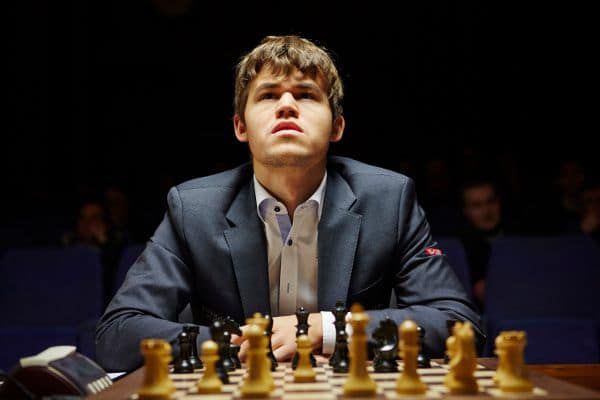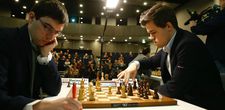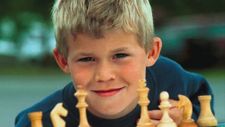 |
| Benjamin Ree: 'A lot of documentaries are too long and I wanted to have a documentary where you feel satisfied, but you still want a bit more' Photo: © Scanpix - Morten Rakke |
Ree describes the film as a coming-of-age story and just as the film charts a journey for its title character, behind the “Mozart of Chess” lies a second hidden tale. “It has been an extraordinary journey for me and I have learned so much from making this film” explains Ree. “Especially to tell a story in the present tense and to be able to create so much tension that the audience can feel it at the end, all of which is so perfect for the story. To have made that work has been an amazing journey.”
In conversation with Eye For Film, Ree reflected on not only the formative influences that led him towards documentary filmmaking, but also discussed the evolution of the modern documentary film. He also discussed the making of Magnus, negotiating hundreds of hours of archival footage and the importance of the opportunity he and his collaborators were afforded to explore their approach to the story. And if Ree described Magnus as a coming-of-age story, his words, “Magnus is a boxing sport film and our reference was Frost/Nixon” indicates that he and Magnus are connected not only by the journey, but having endured and prevailed in their respective bouts – one on the chess board, the other in the editing room.
Why a career in filmmaking? Was there an inspirational or defining moment?
I think I began making films before I was interested in watching films. I always loved telling stories at the dinner table when I was a kid, and then when I was seven years old, we bought a video camera, and I found a way to tell the same kind of stories with the camera. It was great making these stories, showing them to friends and family, and getting great reactions. So I think that was the defining moment and then I started watching films, which I really enjoyed.
Another defining moment was when I started making my first documentaries, before which I'd made fictional films. With documentaries, it was more like fishing. You really didn't know what you were going to get – what kind of access or real-life situations, and I found that so immensely fascinating. The scene in Magnus where he wins the World Chess Championship for the first time, I thought he was going to cry. It is so difficult to become the World Chess Champion, but he was just disappointed because he wasn't satisfied with the last game that he had played, and that kind of scene would not be included in a fiction film. It would have been taken out of the script because it is such an anti-climax, but it’s real life, and that's what happens. The most human thing is to probably feel empty because you've reached your goal, and that's what I love about documentary filmmaking.
There was a time when narrative features and documentaries were discussed independently of one another. It appears that this divide has now been bridged, allowing both to be discussed as storytelling forms. What for you has allowed documentaries to evolve and to be embraced in this narrative concept? Is there a specific reason?
 |
| Benjamin Ree: 'Magnus is regarded as the “Mozart of Chess”, so it was like following Mozart with a camera from the age of 13, to the age of 22, and I thought that was extraordinary' |
So you would attribute technology as being the catalyst for this evolution?
I think so. Back in the sixties, Pennebaker and the Maysles Brothers were the first ones to take the camera up on their shoulder so they could follow people around. And they made some great documentaries, but they didn't show so much because film was so expensive, and so they didn't capture all the crucial moments, or the turning points of people's lives. Then it changed with the video camera when it became much cheaper to film – you could film people over many years. Hoop Dreams was the first film that was shot in the late Eighties with a finished film in 1994. So that was a new revolution and milestone, and the last milestone is the use of all these techniques – putting the camera on your shoulder, filming for hours, filming for years and also the possibility of including archival footage because every family today has a lot. If Amy Winehouse had grown up in the Sixties you couldn't have made that kind of film because you wouldn't have had so much personal footage. Today people film so much that you can tell the story in the present tense with the turning points, and I think that's why documentaries are so great at the moment.
Bringing the discussion around to Magnus, how did you become involved in the film or rather what was the genesis of the documentary?
I started with this film back in early 2013. I was so fascinated by Magnus Carlsen and how by having a completely different approach to all of the greatest chess players in history, he had become the highest rated chess player of all time. He had learned chess from joy and curiosity, while all of the greatest chess players had learned through hard discipline and with strict teachers. So I started collaborating with one of the producers who had filmed Magnus in 2004 - the footage from back in the day was the producer’s. We had so much archival footage we could use to tell the story in present tense that it was like a coming-of-age story - you could follow the child genius. Magnus is regarded as the “Mozart of Chess”, so it was like following Mozart with a camera from the age of 13, to the age of 22, and I thought that was extraordinary.
Documentary filmmakers frequently encounter the daunting task of sifting through and condensing a mass of rushes. In talking to some documentary filmmakers I get the impression that they have an idea of what they want to say, while others don’t necessarily plan what they want to say, but rather let the story find itself. How did you approach the editing of Magnus?
 |
| Benjamin Ree: 'Magnus had learned chess from joy and curiosity, while all of the greatest chess players had learned through hard discipline and with strict teachers' |
Is it necessary for the process to be challenging? Are the arguments and clashes evidence of the passion and commitment from each of you to make the strongest film possible?
Absolutely, and it's so much better. When you have an idea you don't know how it will work until you try it out, and we got the chance to just try out so many things – for example to see the value of taking what we thought was the need for a lot more tension towards the World Chess Championship. We knew that we were going to end up at the World Championships and so it was all about building it up little by little, building the tension, building the underdog story so the audience could feel what Magnus felt.
Chess is really introverted and the film is extroverted - it's visual and emotional. So watching a chess game is like watching paint dry. It's so boring and most people don't understand what's going on, on the board or inside the heads of the chess players. It was all about trying to create an engaging film for those people that don't know anything about chess so that they would enjoy it also.
It seems to be a case of juxtaposition – documentary and narrative techniques, a game that is not exciting to watch, but which is infused with excitement.
Yeah, it's like we were up against a lot of interviews with Magnus talking about what was going on in his head at moments during the chess game. The first World Championship was all narrated with voice overs from Magnus' side and was written like a PowerPoint presentation. It was boring, but it was a good first draft because we could delete all the voice overs and then work with the film language using editing, sound, music, still photography to create the same kind of feeling Magnus had described in words, but in an emotional way. For example, at the World Chess Championship the photographers were like zombies on the outside, which became a visual metaphor for Magnus' inner demons. We used the photographers to create this inner stress, and we used the editing and sound, where the sound of the photographers increases when he has problems during in that game. We didn't use voice overs to tell the story here because we knew this was the way to use it, and this is one example of how we co-worked or interrupted the chess game with the visual film medium.
The success of the film is that while on the surface it appears to be about Magnus, in actuality it is about human nature and universal themes. So Magnus as a character propels the film to become a universally driven story.
Absolutely, and that was what we tried to do. Our aim was to make the film connect on a deeper human level because it’s really about the human drama of the story, about family and this little kid whose parents didn't know where it would end up. So it’s really about how Magnus used his intuition and creativity to become one of the highest rated chess players of all time.
The film will be available on digital, VoD, Blu-ray & DVD from December 12
Watch the trailer below:





















